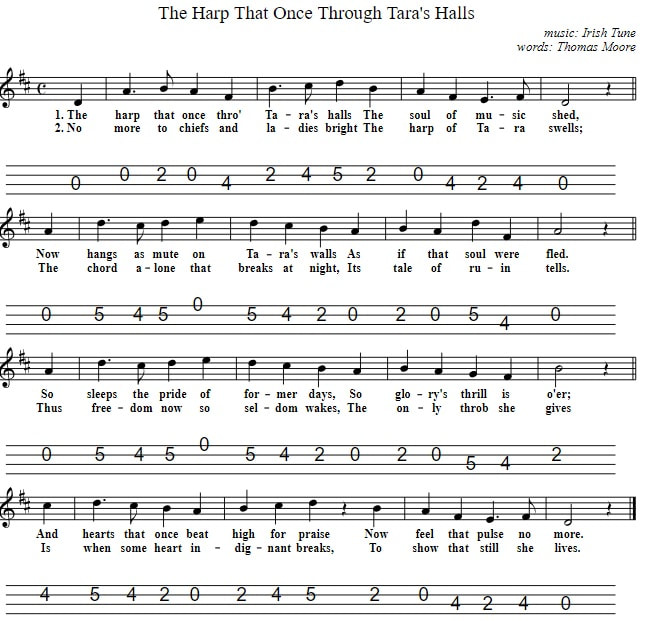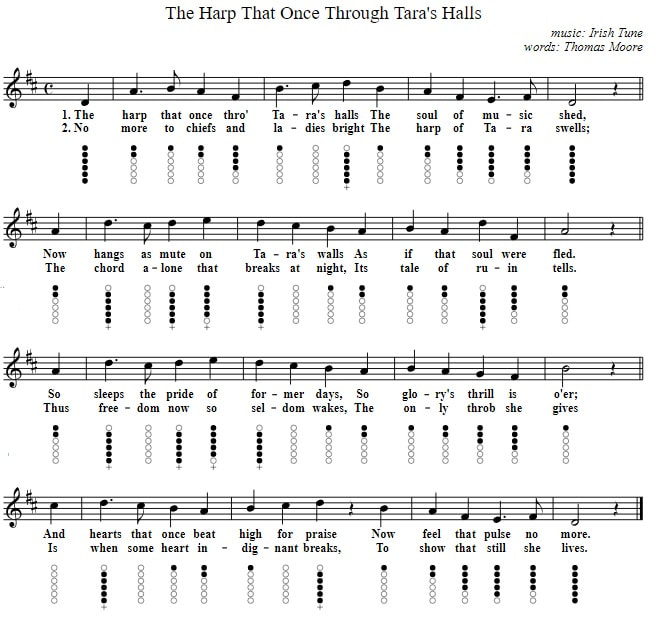Guitar Chords-The Harp That Once Through Tara's Halls
Written by Thomas Moore who also wrote The Meeting Of The Waters ballad . and recorded by The Irish Tenors. Chords in key of C major. Recorded by Irish tenor singer John McCormack. It's one of the shortest songs I have on the site, just two verses in total.
Among the other folk songs that Irish tenor singer John McCormack sang was The Dawning Of The Day Song and The Old House.The harp that once through Tara's halls tin whistle sheet music notes and mandolin tab are included which can be used on the flute.
Among the other folk songs that Irish tenor singer John McCormack sang was The Dawning Of The Day Song and The Old House.The harp that once through Tara's halls tin whistle sheet music notes and mandolin tab are included which can be used on the flute.
[C]The harp that once through[F] Tara's halls
The[C] soul of [G]music[C] shed,
Now[Am] hangs as mute on[F] Tara's walls,
As if that soul were[G] fled
So[C] sleeps the pride of[F] former days,
So glory's thrill is o'er;
[G7]And[C] hearts that once beat[F] high for praise,
Now[C] feel that[G] pulse no[C] more.
No more to chiefs and ladies bright,
The harp of Tara swells
The chord, alone, that breaks at night,
Its tale of ruin tells.
Thus Freedom now so seldom wakes,
The only throb she gives
Is when some heart indignant breaks,
To show that still she lives.
The[C] soul of [G]music[C] shed,
Now[Am] hangs as mute on[F] Tara's walls,
As if that soul were[G] fled
So[C] sleeps the pride of[F] former days,
So glory's thrill is o'er;
[G7]And[C] hearts that once beat[F] high for praise,
Now[C] feel that[G] pulse no[C] more.
No more to chiefs and ladies bright,
The harp of Tara swells
The chord, alone, that breaks at night,
Its tale of ruin tells.
Thus Freedom now so seldom wakes,
The only throb she gives
Is when some heart indignant breaks,
To show that still she lives.
Chords in the key of G Major
[G]The harp that once through[C] Tara's halls
The[G] soul of [D]music[G] shed,
Now[Em] hangs as mute on[C] Tara's walls,
As if that soul were[D] fled
So[G] sleeps the pride of[C] former days,
So glory's thrill is o'er;
[D7]And[G] hearts that once beat[C] high for praise,
Now[G] feel that[D] pulse no[G] more.
Irish songs from G-J
[G]The harp that once through[C] Tara's halls
The[G] soul of [D]music[G] shed,
Now[Em] hangs as mute on[C] Tara's walls,
As if that soul were[D] fled
So[G] sleeps the pride of[C] former days,
So glory's thrill is o'er;
[D7]And[G] hearts that once beat[C] high for praise,
Now[G] feel that[D] pulse no[G] more.
Irish songs from G-J
The harp that once through Tara's Halls mandolin / Tenor Banjo sheet music tab
This sheet music is suitable for the flute.




